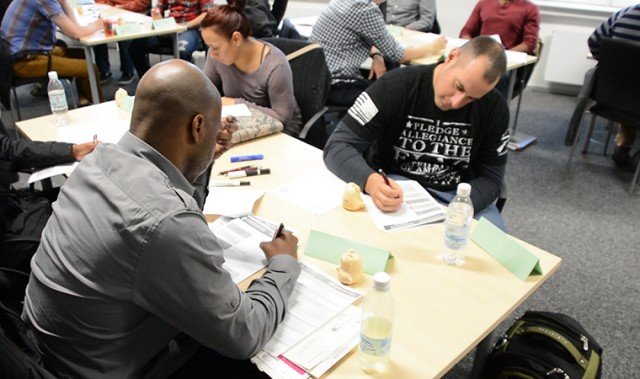
Story & photo by Greg Jones
USAG Stuttgart Public Affairs Office
Since resilience training was incorporated into the U.S. Army Garrison Stuttgart in-processing program, a joint community that may be new to this Army-centric program has found itself ‘hunting the good stuff,’ ‘being the ball,’ and definitely ‘putting it all in perspective.’
But what does all of this mean, and what’s the real value?
Master Resilience Training consists of four modules with a number of resilience skills in each module. The resilience training provided at USAG Stuttgart in-processing, and the annual resilience training required of Soldiers, consists of a selection of these resilience skills. Familiar resilience catch phrases like, “hunt the good stuff,” “putting it all in perspective” and “avoiding thinking traps” are all resiliency skills that are part of the required training.
The skills focus on using positive thinking techniques to maximize an individual’s ability to bounce back from adversity. From minimizing negative thoughts, to implementing self-improvement techniques and maintaining a positive perspective in all situations, the training is meant to empower individuals to help themselves.
The skills taught in resilience training have real value, according to Master Resilience Trainer Sgt. 1st Class David Miedaner, Headquarters and Headquarters Company, USAG Stuttgart, who explained that he receives positive feedback on a regular basis from those who have attended resilience training.
“I’ll see people all the time and they stop me and say, ‘Hey, you were my resilience instructor,’” he said. “Then, they go on to tell me how the resilience techniques helped them through their challenging PCS (permanent change of station) or at some other tough time. It’s a good feeling hearing that people are actually out there putting this training to use.”
After losing a Soldier to an improvised explosive device during a deployment, Master Resilience Trainer, 1st Sgt. Amador Aguillen, Headquarters and Headquarters Company, USAG Stuttgart, had difficulty accepting the incident. As the Soldier’s leader, Aguillen felt responsible and began to feel the heavy mental effects of the incident.
“I blamed myself for a lot of reasons, almost to the point where I downward-spiraled into thinking negative,” he said. “But then I jarred myself loose by putting it into perspective. I wasn’t there when it happened, and I had done all I could as a leader. It was still a tragedy, but I was able to deal with it better.
“Having these skills has made me more resilient, and I’m able to share these skills in the classroom to help make others more resilient,” he said.
The history of resilience
The concept of psychological resilience is not new and has been around since the early 1970s, according to an article co-written by Karen Reivich and Martin Seligmann of the University of Pennsylvania, and (then Lt. Col.) Sharon McBride of the Army’s Master Resilience Trainer Program, published in American Psychology. However, applying the concepts to a classroom-style training program was developed by the University of Pennsylvania in the 1990s and early 2000s.
The Army’s Master Resilience Training program was developed in 2009 from the University of Pennsylvania’s internal Penn Resilience Program. In collaboration with the Army, the university refined the program with a military audience in mind, and with a focus on specific adversities faced by the military population, according to the American Psychology article.
Editor’s Note: The American Psychology article cited above can be found at www.ppc.sas.upenn.edu.
To help the community learn more about local resources that promote health and resiliency, USAG Stuttgart will host three resiliency carnivals in February.
